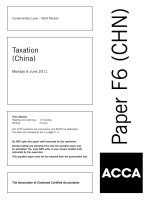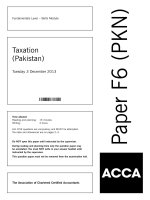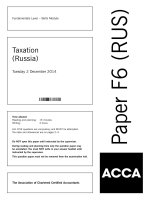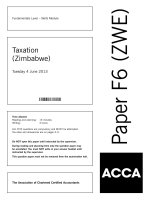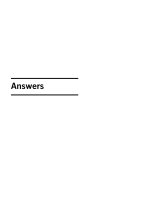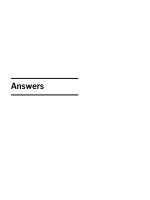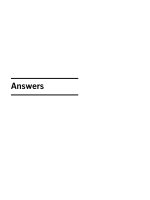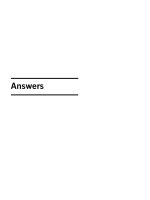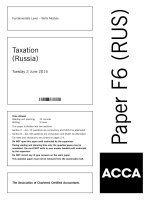ACCA f6 taxation zimbabwe 2014 jun question
Bạn đang xem bản rút gọn của tài liệu. Xem và tải ngay bản đầy đủ của tài liệu tại đây (362.4 KB, 17 trang )
Taxation
(Zimbabwe)
Tuesday 3 June 2014
Time allowed
Reading and planning:
Writing:
15 minutes
3 hours
ALL FIVE questions are compulsory and MUST be attempted.
Tax rates and allowances are on pages 3–5.
Do NOT open this paper until instructed by the supervisor.
During reading and planning time only the question paper may
be annotated. You must NOT write in your answer booklet until
instructed by the supervisor.
This question paper must not be removed from the examination hall.
The Association of Chartered Certified Accountants
Paper F6 (ZWE)
Fundamentals Level – Skills Module
This is a blank page.
The question paper begins on page 3.
2
SUPPLEMENTARY INSTRUCTIONS
1.
2.
3.
Calculations and workings need only be made to the nearest US$1, unless directed otherwise.
All apportionments should be made to the nearest month.
All workings should be shown.
TAX RATES AND ALLOWANCES
The following tax rates and allowances are to be used when answering the questions.
Tax rates – Individuals employment income
Year ended 31 December 2013
Taxable
income band
US$
Up to 3 000
3 001 to 12 000
12 001 to 24 000
24 001 to 60 000
60 001 to 90 000
90 001 to 120 000
120 001 and over
Rate
of tax
%
0
20
25
30
35
40
45
Amount
within band
US$
3 000
9 000
12 000
36 000
30 000
30 000
Cumulative income
tax liability
US$
0
1 800
4 800
15 600
26 100
38 100
NB. The AIDS levy of 3% is chargeable on income tax payable, after deducting credits.
Allowable deductions year ended 31 December 2013
Pension fund contribution ceilings
(a)
(b)
(c)
(d)
US$
5 400
5 400
2 700
In relation to employers: in respect of each member
In relation to employees: by each member of a pension fund
In relation to each contributor to a retirement annuity fund or funds
National Social Security contributions (on a maximum monthly gross
salary of US$700)
Aggregate maximum contributions to all the above per employee per year
3·5% of gross salary
US$5 400
Credits year ended 31 December 2013
US$
900*
900*
50%
50%
Disabled/blind person
Elderly person (55 years and over)
Medical aid society contributions
Medical expenses
* The amount is reduced proportionately if the period of assessment is less than a full tax year.
Deemed benefits year ended 31 December 2013
Motor vehicles
Engine capacity:
Up to 1500cc
1501 to 2000cc
2001 to 3000cc
3001 and above
US$
1 800
2 400
3 600
4 800
3
[P.T.O.
Loans
The deemed benefit per annum is calculated at a rate of LIBOR +5% of the loan amount
advanced.
Value added tax (VAT)
Standard rate
15%
Capital allowances
%
25
25
Special initial allowance (SIA)
Accelerated wear and tear
Wear and tear:
Industrial buildings
Farm buildings
Commercial buildings
5
5
2·5
Motor vehicles
Movable assets in general
20
10
Tax rates – Other than employment income
Year ended 31 December 2013
%
Companies
Income tax: Basic rate
AIDS levy
25
3
Individuals
Income tax: Income from trade or investment
AIDS levy
25
3
4
Capital gains tax
On marketable securities
20% of gain
Disposal of listed marketable securities acquired after 1 February 2009 1% of gross proceeds
Disposal of specified assets acquired prior to 1 February 2009
5% of gross proceeds
0%
On principal private residence where the seller is over 55 years
On other immovable property acquired on or after 1 February 2009
20% of gain
Inflation allowance
2·5%
Capital gains withholding tax on sale proceeds
Immovable property
Marketable securities (listed) acquired before 1 February 2009
Marketable securities (unlisted)
Note: The withholding tax is not final on the seller. Actual liability is assessed
in terms of the Capital Gains Tax Act.
%
15
5
5
Withholding taxes
On dividends distributed by a Zimbabwean resident company to resident shareholders
other than companies and to non-resident shareholders:
By a company listed on the Zimbabwe Stock Exchange
By any other company
Informal traders
Foreign dividends
%
10
15
10
20
Non-residents’ tax
On interest
On certain fees and remittances
On royalties
%
nil
15
15
Residents’ tax on interest
From building societies
From other financial institutions (including discounted securities)
%
15
15
Elderly taxpayers (55 years and over)
Exemptions from income tax year ended 31 December 2013
Rental income
Interest on deposits with a financial institution
Interest on discounted instruments
Income from the sale or disposal of marketable securities
Pension
US$
3 000
3 000
3 000
1 800
No limit
Income from the sale or disposal of a principal private residence is also exempt.
5
[P.T.O.
ALL FIVE questions are compulsory and MUST be attempted
1
Nic Page is a nutritionist, who has worked in the food and allied industry for Organo Products Limited (Organo) for
the past 15 years. Organo had a change of management in 2013 and Nic’s post was made redundant on 31 May
2013. On the redundancy of his post, Nic was offered the opportunity to acquire his company allocated motor vehicle
for US$20 000. The motor vehicle, which has an engine capacity of 3300cc, was acquired by Organo in 2010 at a
cost of US$60 000. The market value of the vehicle as at 31 May 2013 was US$45 000.
Following his redundancy, Nic started his own catering services company, Page Catering (Private) Limited (PCPL). In
the year ended 31 December 2013 PCPL entered into two contracts as follows:
(1) A consultancy services contract with Organo for a period of a year with effect from 5 June 2013. According to
the terms of this contract, Nic (via PCPL) is to provide his own work tools and equipment, invoice Organo
monthly for any work completed and be paid within 30 days from the date of the invoice presentation. PCPL
invoiced Organo for US$800 in each of the months June to September 2013 and for US$1 000 in each of the
months October to December 2013.
(2) A catering services contract for US$10 000 per month with a group of private schools in Harare on 1 August
2013. Also on 1 August 2013, PCPL recruited a staff complement of five permanent employees and six casual
workers. The permanent employees are paid monthly salaries, while the casual workers are paid a predetermined
daily wage rate in line with the industry norm. Three of the permanent employees are each paid US$500 per
month, while the other two employees are paid US$700 and US$800 per month respectively.
Nic Page’s employment related earnings and deductions for the year ended 31 December 2013 were:
Note
From Organo Products Limited
Salary
Leave pay
School fees allowance
Housing allowance
Bonus
Refund of benefit fund contributions
Annuity
Refund of pension contributions
Employee contributions to the benefit fund
NSSA contributions
Employee pension contributions
Retirement annuity fund (RAF) contributions
Loan repayment
Employee contributions to the Royal Medical Aid Society
Home insurance policy contributions
Funeral insurance policy contributions
PAYE
From Page Catering (Private) Limited
Salary (from catering services contract)
Fuel allowance
PAYE
(1)
(2)
(3)
(4)
(5)
US$
10 000
2 000
5 000
2 500
2 000
30 000
7 000
92 500
(750)
(123)
(2 250)
(3 700)
(1 400)
(3 000)
(1 300)
(600)
(18 500)
8 000
15 000
(7 600)
Notes:
(1) This amount is a refund of the contributions made by Nic to a non-registered benefit fund administered by
Organo. Every employee was required to contribute to the fund as one of the conditions of employment. The
amount refunded to Nic is broken down as follows:
US$
27 000
3 000
–––––––
30 000
–––––––
–––––––
Total employee contributions over the years
Interest component
6
(2) Nic is entitled to receive this amount annually from a retirement annuity fund (RAF) which matured during the
course of the year 2013. He expects to receive the same amount for the next ten years. A total of US$15 000
was disallowed as a deduction from the onset of his RAF contributions up to the maturity date.
(3) This amount was refunded to Nic when his post was made redundant and he opted to withdraw from Organo’s
employer registered pension fund. His contributions over the years to this employer registered pension fund were
all allowed as a tax deduction. Nic transferred US$30 000 from the amount refunded to the Catering Industry
Pension Fund (CIPF).
(4) This amount is a repayment of a US$15 000 loan advanced to Nic by Organo on 1 March 2013. The loan is
repayable over the period of a year at an interest rate of 1% per annum. The LIBOR for the period was constant
at 0·5%.
(5) Nic receives a fuel allowance for using his personal vehicle for the catering business. 70% of the fuel allowance
received was applied towards fuel expenses for business purposes.
Required:
(a) Explain the tax obligations of Organo Products Limited in connection with the payment of the consultancy
services fees to Page Catering (Private) Limited (PCPL).
(2 marks)
(b) Explain by when PCPL should have registered for the following taxes and state the dates when the first
returns should have been submitted:
(i)
Corporate tax;
(2 marks)
(ii) Employees tax (PAYE);
(2 marks)
(iii) Value added tax (VAT).
(2 marks)
(c) Calculate the NSSA contributions to be paid by PCPL in its capacity as employer for the year ended
31 December 2013.
(2 marks)
(d) Calculate Nic Page’s income tax payable/refundable from employment for the year ended 31 December
2013.
Note: Indicate any amounts which are not taxable or not deductible by the use of zero (0).
(15 marks)
(25 marks)
7
[P.T.O.
This is a blank page.
Question 2 begins on page 9.
8
2
H&H Motor Spares (Private) Limited (H&H) is in the retail business of motor spare parts and consumables.
During the year ended 31 December 2013, H&H entered into a 15-year lease agreement with a commercial property
owner for the construction of a warehouse for the storage of their stock. The terms of the lease agreement are as
follows:
(1) H&H to construct a warehouse on the property owner’s undeveloped commercial land in East Industrial Park at
a total cost of not less than US$300 000. H&H to further pave the whole area around the warehouse with the
specified brickwork at a cost of not less than US$50 000. All the work to be completed within six months from
the date of the lease agreement, which was signed on 1 February 2013.
(2) H&H to pay a one-off premium of US$60 000 and a monthly rent of US$3 000 from the date the lease
agreement was signed. The rent to be reviewed at the beginning of each calendar year in line with the market
rentals for similar properties.
(3) The lease agreement to be open to renewal after the expiry of the initial agreed period.
H&H completed the construction of the warehouse and the pavement on 30 June 2013 at a total cost of
US$350 000 and US$70 000 respectively and immediately transferred their stock to the newly constructed
warehouse.
H&H’s statement of profit or loss for the year ended 31 December 2013 is as follows:
Note
US$
1 600 000
(1 060 000)
––––––––––
540 000
800 000
(70 000)
(360 000)
(100 000)
(80 000)
––––––––––
730 000
(46 351)
––––––––––
683 649
––––––––––
––––––––––
Revenue
Cost of sales
Gross profit
Other income
Distribution costs
Administrative expenses
Other expenses
Finance costs
1
2
3
4
5
Profit before tax
Income tax expense
6
Profit for the period
Notes:
1
Other income comprises:
Rental income
Profit on the sale of commercial vehicles (see below)
US$
500 000
300 000
––––––––
800 000
––––––––
––––––––
The commercial vehicles had been purchased in 2009 for US$200 000 and were sold during the year for
US$500 000.
2
Distribution costs comprise:
US$
40 000
30 000
–––––––
70 000
–––––––
–––––––
Repairs and maintenance
Fuel and licensing
9
[P.T.O.
3
Administrative expenses comprise:
US$
112 000
93 000
30 000
5 000
40 000
30 000
20 000
10 000
20 000
––––––––
360 000
––––––––
––––––––
Salaries and wages
Lease premium and warehouse rent
Donations (see below)
Value added tax (VAT) late payment charge
Depreciation
Provision for directors’ fees
Protective clothing
Staff canteen provisions
Entertainment
As part of H&H’s corporate social responsibility commitment, the following amounts were donated during the
year:
–
–
4
Harare Central hospital (for the procurement of critical drugs)
Social club (for recurrent expenses)
US$20 000
US$10 000
Other expenses comprise:
Property repairs and maintenance (see below)
Legal fees (preparation of the shareholder’s agreement)
New business licences
Renewal of business licences
US$
60 000
5 000
8 000
27 000
––––––––
100 000
––––––––
––––––––
Property repairs and maintenance were as follows:
–
–
5
On leased commercial properties (the rental income from these
properties is as detailed in note 1 above)
On an unoccupied commercial building
Finance costs comprise:
Overdraft facility for recurrent expenditure
Loan for the construction of the warehouse and paving
6
US$48 000
US$12 000
US$
30 000
50 000
–––––––
80 000
–––––––
–––––––
Income tax expense:
This amount relates to the first and second provisional corporate tax payments made by H&H in respect of the
year ended 31 December 2013. The payments were based on a projected taxable income of US$514 300. No
further provisional corporate tax payments were made in the year.
Due to favourable business circumstances in the second half of the year, H&H revised their 2013 budget on
1 July 2013 and the projected taxable income for the year ended 31 December 2013 was recalculated as
US$815 000.
Additional information
H&H owned the following fixed assets as at 31 December 2013:
Commercial properties
Furniture and equipment
Commercial vehicles
Date acquired
2009
2010
2013
10
Cost/valuation (US$)
300 000
150 000
180 000
H&H has always claimed the maximum capital allowances possible in any given year.
Required:
(a) (i)
State how the commercial property owner should treat the amounts specified in the signed lease
agreement with H&H Motor Spares (Private) Limited (H&H) for tax purposes.
(3 marks)
(ii) State, giving reasons, what action H&H should have taken when implementing the provisions of the
lease agreement in order to minimise its tax liability.
(2 marks)
(b) Calculate the taxable income of and corporate tax payable by H&H for the year ended 31 December 2013.
Note: Your computation should list all of the items referred to in notes 1 to 5, indicating by the use of zero
(0) any items which do not require adjustment.
(18 marks)
(c) (i)
Calculate the provisional tax which should have been paid by H&H based on the revised budget for the
year ended 31 December 2013, clearly indicating the due dates and the respective tax amounts.
(4 marks)
(ii) Calculate the penalties and interest payable by H&H as at 31 December 2013 due to its failure to
comply with the quarterly payment date (QPD) provisions.
(3 marks)
(30 marks)
11
[P.T.O.
3
Jacob and Anne Dube, aged 58 and 53 respectively, have been horticulturists for the greater part of their 30-year
marriage. They carried on their horticulture business on a plot of land which they owned, situated adjacent to the
Matopo resort in Bulawayo. However, in recent years the running expenses of the business have outweighed the
income streams and in 2013 the couple decided to dispose of the plot and their other business assets.
The plot consists of a homestead, which has always been occupied by Jacob and Anne, and both permanent and
temporary improvements in line with the business of horticulture. A local estate agent valued the property on 10 June
2013 as follows:
US$
100 000
250 000
100 000
20 000
30 000
50 000
60 000
70 000
65 000
––––––––
745 000
––––––––
––––––––
Land
Homestead
Staff housing
Permanent roads
Temporary garden sheds
Office building
Furniture and office equipment
Dam and boreholes
Tractors
Jacob and Anne acquired the undeveloped plot on 7 March 2009 for US$50 000 and effected the improvements on
a piecemeal basis over the years as follows:
Date acquired/
constructed
Homestead
Staff housing
Permanent roads
Temporary garden sheds
Office building
Furniture and office equipment
Dam and boreholes
Tractors
Cost
US$
100 000
40 000
10 000
20 000
30 000
50 000
35 000
45 000
––––––––
330 000
––––––––
––––––––
2009
2009
2010
2010
2009
2009
2009
2010
Income tax value (ITV)
as at 31 December 2012
US$
N/A
0
2 500
N/A
27 000
0
N/A
11 250
Jacob and Anne signed an agreement of sale for their property on 20 June 2013 through the local estate agent and
the selling price was paid as follows:
On signing the agreement of sale
On 31 October 2013 (balance attributable to all the assets except the land)
On 1 June 2014 (full settlement for the land)
US$
300 000
390 000
100 000
––––––––
790 000
––––––––
––––––––
Additional information
1.
A 10% selling commission was paid to the local estate agent on 20 June 2013.
2.
Jacob and Anne signed another agreement of sale on 10 November 2013 for the acquisition of their new
residential home in Northville Plateau, Bulawayo for US$200 000.
12
Required:
(a) State ANY FOUR documents which Jacob and Anne Dube should present to ZIMRA when applying for a
(2 marks)
capital gains tax clearance certificate.
(b) (i)
Calculate the amounts to be included in the gross income of Jacob and Anne Dube for the year ended
31 December 2013 as a result of the disposal of their business assets.
(3 marks)
(ii) Calculate the capital gains tax payable by Jacob and Anne Dube on the disposal of their business assets
for the years ended 31 December 2013 and 31 December 2014, if all relevant reliefs are claimed
(8 marks)
(c) Identify the capital gains tax reliefs available to Jacob and Anne Dube as a result of the disposal of the
homestead.
Note: Calculations are not required for this part.
(2 marks)
(15 marks)
13
[P.T.O.
4
Curios & Souvenirs Unlimited (Private) Limited (CSU), which was incorporated in 2010, is headquartered in the resort
town of Victoria Falls but with shops in all the major resort areas in Zimbabwe. In addition to its headquarters building
and shops, CSU also owns commercial holiday cottages and self-catering lodges located in Victoria Falls.
CSU is registered with ZIMRA for corporate tax and employees tax (PAYE) and holds an income tax clearance
certificate issued on 1 April 2013.
CSU’s monthly sales revenue for the year ended 31 December 2013 showed a consistently upward trend as follows:
US$
3 000
3 500
4 000
4 200
4 300
4 800
5 200
55 000
50 000
53 000
40 000
47 000
––––––––
274 000
––––––––
––––––––
January
February
March
April
May
June
July
August
September
October
November
December
As a result of its significant increase in sales revenue in the second half of 2013, CSU was compulsorily registered
for value added tax (VAT) under category B with effect from the tax period ended 31 August 2013. ZIMRA allowed
CSU to claim the input tax on procurements made from registered operators from the date of compulsory registration.
CSU had chosen not to voluntarily register for VAT prior to this date and none of the above figures include VAT.
CSU’s purchases (inclusive of VAT) for the year ended 31 December 2013 are as follows:
US$
1 200
1 500
2 000
2 000
2 000
2 500
3 000
20 000
20 000
20 000
15 000
15 000
––––––––
104 200
––––––––
––––––––
January
February
March
April
May
June
July
August
September
October
November
December
CSU’s other expenses (inclusive of VAT where applicable) for the year ended 31 December 2013 are as follows:
US$
35 000
9 000
15 000
12 000
5 000
Salaries and wages
Stationery
General repairs and maintenance
Motor vehicle expenses
Cleaning and other general expenses
30% of the general repairs and maintenance and 20% of the motor vehicle expenses were procured from unregistered
operators.
14
Required:
(a) State the tax compliance obligations which Curios & Souvenirs Unlimited (Private) Limited (CSU) must have
(4 marks)
satisfied for ZIMRA to have issued a valid income tax clearance certificate on 1 April 2013.
(b) (i)
Explain briefly the FOUR categories of value added tax (VAT) period.
(4 marks)
(ii) State the date of CSU’s VAT period ending immediately after its 31 August 2013 tax period, together
with the due date for the submission of the VAT return for this tax period.
(1 mark)
(c) Calculate the total VAT to be paid by or refunded to CSU from the date of its compulsory registration to
31 December 2013.
Note: Indicate any items on which VAT is not chargeable by the use of a zero (0).
(6 marks)
(15 marks)
15
[P.T.O.
5
Mutsa Shangu is a non-executive director of a number of companies within Zimbabwe. She is a photojournalist by
profession and works as a freelancer. She spends most of her time outside Zimbabwe on work related assignments.
Mutsa is ordinarily resident in Zimbabwe for tax purposes.
During the year ended 31 December 2013, Mutsa ventured into the film production business in Zimbabwe. She
recruited a qualified manager and two assistants to help her run the business. Mutsa’s film production business
recorded two films in Zimbabwe during the year ended 31 December 2013. These films were marketed in Botswana
in 2013 but have not yet been shown in Zimbabwe.
Mutsa owns a furnished house in Gaborone, Botswana where she normally resides while working on assignments in
that country. She also lets out the house to tenants during her absences from Botswana.
Mutsa’s income and expenses for the year ended 31 December 2013 are as follows:
Income
Non-executive director’s fees
Freelance income
Film production income
Rental income from Botswana house
Zimbabwe bank interest
Dividends received from a Botswana company
Expenses
Travelling expenses
Film production expenses
Botswana house repairs and maintenance
Note
1
2
3
US$
48 000
70 000
60 000
30 000
10 000
12 000
15 000
41 000
17 000
Notes:
1
The film production income was earned in Botswana from the marketing of the two films produced during the
year.
2
The travelling expenses were all incurred in connection with Mutsa’s freelance work.
3
The film production expenses comprise:
US$
9 000
12 000
5 000
15 000
–––––––
41 000
–––––––
–––––––
Office rent
Salaries and wages
Other office running expenses
Foreign marketing expenses
Additional information
Mutsa acquired the following fixed assets during the year ended 31 December 2013 for her film production business.
The assets were all wholly used for business purposes.
Cost
US$
25 000
30 000
40 000
–––––––
95 000
–––––––
–––––––
Office furniture and equipment
Film production equipment
Passenger motor vehicle
16
Required:
(a) (i)
State the implications for Mutsa Shangu of being ordinarily resident in Zimbabwe for tax purposes.
(2 marks)
(ii) Calculate the minimum taxable income of and tax payable by Mutsa Shangu for the year ended
31 December 2013.
Note: Indicate any amounts which are not taxable or not deductible by the use of zero (0). (10 marks)
(b) Identify and briefly explain the TWO major sources of tax revenue law.
(3 marks)
(15 marks)
End of Question Paper
17
